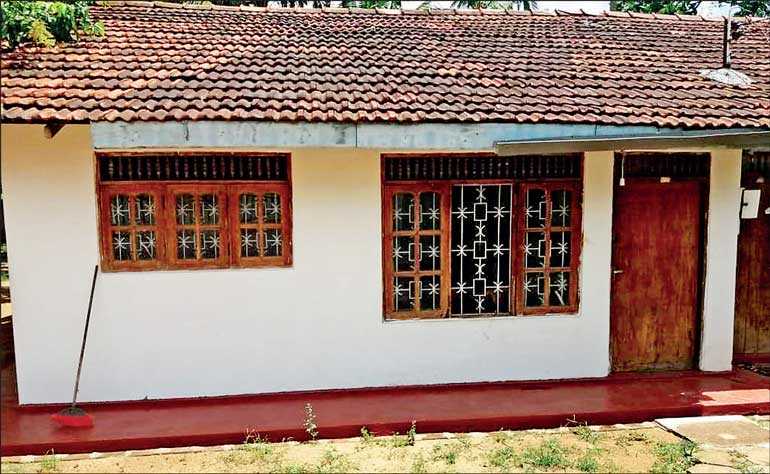Saturday Feb 21, 2026
Saturday Feb 21, 2026
Friday, 19 April 2019 00:10 - - {{hitsCtrl.values.hits}}

Trial by fire is not a new ordeal to Christian community. It predates Notre Dame and Nazism by millennia. In fact, a decade or so before Nero torched believers to light Roman avenues, Jewish religious leaders put Jesus-followers to the test as the Church started to grow in 1st C. AD Jerusalem. Now, in a little island nation that is arguably the last refuge of Dhamma, the burning has begun again.
This time, as in virtually every other instance mentioned above, the attacks seem systematic. They may be even systemic in the sense of being ignored by the state where once such attacks were encouraged.
The factors below may suggest a few remedial measures if Sri Lanka is to take national reconciliation seriously and walk the talk on pluralism.
Sporadic attacks or strategic attitude?
A cursory glance at the incidence of anti-Christian activity might suggest that attacks against the small island community are sporadic. A closer look will show that majority Catholics and other mainstream denominations are exempt for a raft of reasons – at least until now.
The conclusion could well be that these are local groundswells against egregious conversion strategies employed by evangelistic crusades essayed by new groups or home churches. But that simplistic assumption was exploded by the incidents in Anuradhapura this week. And the sporadic attacks recorded so far represent only the tip of an iceberg; which, beneath the surface of samsaric repetitiveness, betrays a cycle of systemic or systematic hostility against a dying faith in our shared isle…
Political issue or policing problem?
To assume that the attacks are politically motivated only scratch at the surface. A safer bet is that they are apolitically mismanaged.
Once upon a time in Serendip, the chauvinism of a militaristic regime was not only blatant but palpable in its hostility towards any ‘Other’ community of faith inimical to the ‘State’ philosophy. Today, militant Buddhism seems the perverted doctrine of only a few. But they benefit – to the detriment of their victims as well as the compassionate spirit of inclusivity and pluralism – from both political apathy and police ignorance.
The government doesn’t care to get involved, leaving their silence hanging in the air like a funereal pall at Notre Dame or Nochchiyagama. Mr Goon and PC Plod don’t know, and their instruction to those attacked to cease and desist from their lawful activity smacks of high-handed lack of education. They could do with instruction from the IGP downwards, on how best to distinguish plaintiffs from perpetrators.
All-for-one or all-alone?
In the same week that Notre Dame’s charred silhouette inspired the people of another republic, our democratic profile looked perilously shaky. Apart from armchair warriors on Twitter, few activists – perhaps owing to the protracted traditional holiday season – raised their voices let alone raised funds to built burnt churches.
Even on Facebook, our café society seemed more concerned with restoring French stained glass that applying balm to fellow Sri Lankans’ wounds. As the French themselves would say: “Honi soit qui mal y pense” – or shame be on him or her who thinks evil of it to stand in solidarity with the battered, broken, bruised, debased things of this world…
Most tellingly, the silence of the established church has rung louder bells in true believers’ ears than the craven absence of state actors at the site of the attacks. It is a cardinal lapse of judgment to leave sister congregations to the legions of diabolical chauvinism. No matter how tempting it may be to exempt oneself from drawing unnecessary attention. But that silence may speak more eloquently about the lukewarm response that the larger Church has received in Sri Lanka. After over five hundred years and at least three streams of Christianity, less than ten percent of islanders have been even nominally impressed by the Carpenter’s movement to move themselves to embrace it.
But hearteningly, sisters and brothers in the greater community of a shared faith in diversity, inclusivity and pluralism have not only reached out but stood up for the attack and against the attackers. One of them tweeted – to the president and opposition leader, no less: “Would you mind issuing a statement condemning the Sunday attack on the Methodist Church Centre in Anuradhapura? Or would you not want to upset your racist voter base?” Not in ‘extra ecclesiam nulla salus’ (There is no salvation outside the Church), but in this does the safety and safeguarding of the Christian community exist; and a good thing it is!
In the spirit of full disclosure, let me admit to belonging to the community – in name, faith, culture – that was attacked in Anuradhapura. Let me also confess that Christians – whether Anglican, Baptist, Catholic, Dutch-Reformed, Evangelical – have been guilty (as much as any other religious human being) of faith-inspired excesses. From ardent exclusivity to equally fervent attempts at unethical adoption into respective folds!
Be that as it may, dogma and doctrine aside, it is their democratic right and constitutional guarantee that they – we, I, you – be allowed the right to life, liberty and the pursuit of whatever little light shines in the darkness. By way of teaching, sharing the secrets of discovered treasures, living with more than a measure of compassion for all beings. May all such sufferers be safe, happy, linked a destiny in a land that is demonstrably the last best hope for the dream that faiths and philosophies can coexist in harmony and mutual respect.
That dream and democratic right are being threatened by political apathy and police ignorance. If Sri Lankan leaders and law-enforcement officials don’t repent of their “we don’t know, we don’t care” attitude, we might as well burn all buildings housing religious activity in every verdant village and be done with it! While appealing to militant secularism to donate charitably to rebuild some stained-glass monument to ethnic exceptionalism? And if yours truly is to be detained or indicted under the little used or once recently abused ICCPR Act for saying so, so be it – for we have descended from the sublime to the ridiculous in that respect.
(Journalist | Editor-at-large of LMD | Writer #SpeakingTruthToPower)